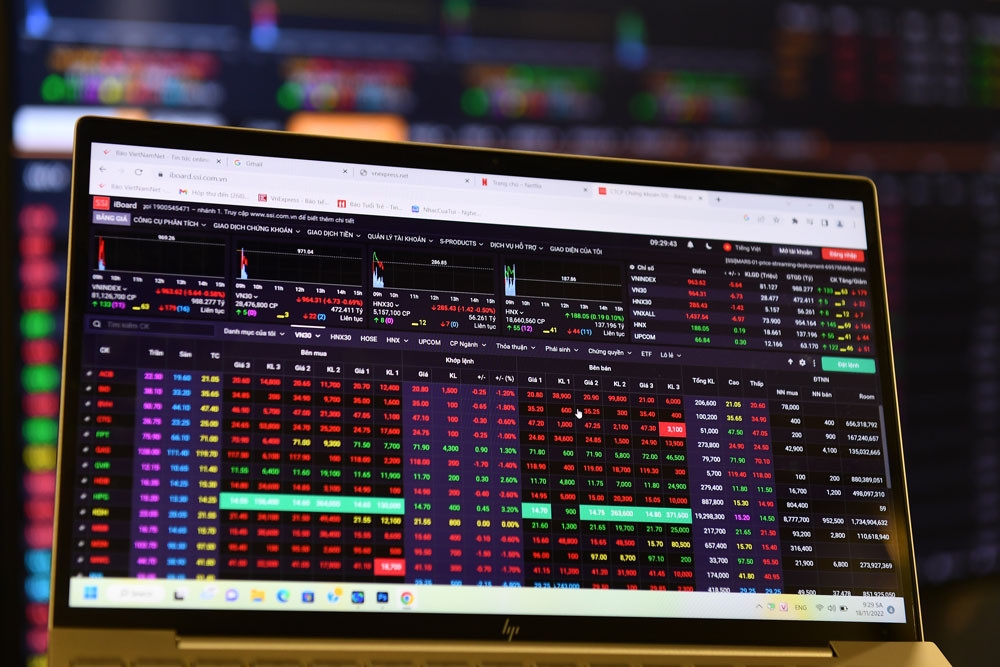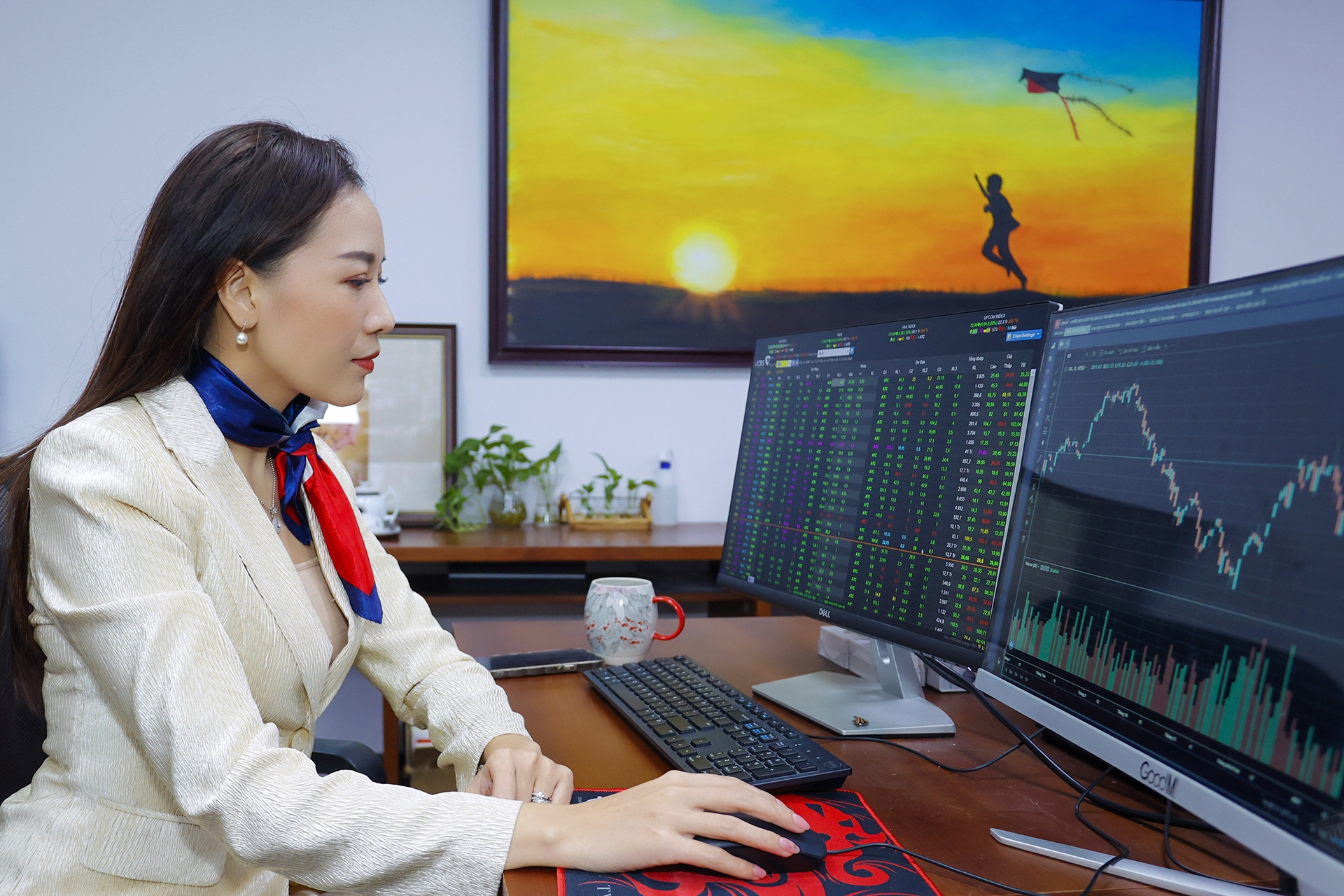The VN-Index continued to fall, falling below 1,200 points at one point in the morning session of November 20 due to record net selling pressure from foreign investors and caution from domestic investors.
During the trading session on November 20, selling pressure continued to increase while demand was very low. The VN-Index at one point fell more than 7 points to 1,198 points; by 10am, it had risen back above the 1,200 point threshold.
At 10:45, VN-Index increased 8.6 points to nearly 1,214 points.
Since the beginning of 2007, the VN-Index has fallen below the 1,200 point mark dozens of times. The VN-Index rising and falling below the 1,200 mark has become a familiar story to stock investors in Vietnam over the years.
Thus, since the beginning of 2022 - when the Vietnamese stock market created a historical peak of 1,528.57 points, this is still the highest level that this index has ever reached and has not been reached a second time.
Earlier this year, the VN-Index regained its footing and reached nearly 1,300 points, but recently it has fallen rapidly to the 1,200 point mark - a development that is in contrast to many stock markets around the world . US stocks have set new historical highs dozens of times since the beginning of this year.
Notably, although Vietnam has recently stepped up efforts to remove obstacles to elevate its stock market from a frontier market to an emerging one, foreign investors are still selling heavily. According to some experts, it is difficult to expect a clear change in the short term.

According to SSI Securities, a small number of transactions have been made. Circular 68 has prompted some active fund managers to increase their allocation to Vietnam as investing becomes more cost-effective, but the scope is quite small.
Since the beginning of the year, foreign investors have net sold about VND85,000 billion on the Ho Chi Minh City Stock Exchange (HoSE) - an unprecedented high record.
Foreign investors sold even though Vietnam's stock market and economy were still positively evaluated.
However, the issue of exchange rate increases this year and recently emerged after Donald Trump was elected US President has made many people worried. Since the beginning of the year, the USD/VND exchange rate calculated according to Vietcombank 's listed price has increased by nearly 4.5%.
The devaluation of VND reduces the performance of foreign funds. It makes it difficult for funds to raise capital, even putting pressure on them to withdraw.
The exchange rate is not expected to cool down as the US economy is still quite strong and will be positive when Mr. Trump takes office. The signal of the US Federal Reserve (Fed) delaying interest rate cuts also contributed to the USD's rise.
A strong USD in the international market causes most other currencies, including VND, to decline.
Domestically, cash flow into the stock market has recently shown signs of decline with liquidity falling sharply.
Money still seems to be flowing into and staying in the banking system, even though interest rates are low compared to many years ago, only about 5-6%/year.
By the end of August, according to the State Bank, the amount of deposits from individuals reached more than 6.92 quadrillion VND, up 6% compared to the end of 2023, the highest level ever. Deposits from economic organizations increased to 6.83 quadrillion VND, with a total of 13.75 quadrillion VND flowing into the banking system. This is also the highest level ever.
Forecasting this week's stock market, Mr. Dinh Quang Hinh, Head of Market Strategy Department, VnDirect Securities Analysis Division, said that exchange rate continues to be the focus of attention.
Accordingly, the central exchange rate continuously adjusted upward by the State Bank of Vietnam last week and the interbank exchange rate almost returning to its mid-year peak, combined with the interbank interest rate increasing again to over 5%, has negatively impacted investor sentiment as well as the performance of banking, securities, and steel stocks, which are highly sensitive to fluctuations in exchange rates and interest rates.
According to Mr. Hinh, the net selling momentum of foreign investors focusing on bluechips also increased pressure on stock indices. In the context of the lack of strong enough supporting information and no signs of a sustainable cooling of interbank interest rates and exchange rates, portfolio risk management should be prioritized at this time.
By 10:00 a.m. on November 20, the VN-Index had fallen 0.8 points to 1,204 points. Liquidity on HoSE reached VND3,550 billion. Some banking, real estate and securities stocks recovered and turned green, helping the VN-Index regain the 1,200 point mark.
Masan (MSN) shares on the morning of November 20 fell to 69,100 VND/share (then rose again to 70,300 VND at 10:38); FTP fell 3,000 VND to 126,700 VND/share. Vinhomes (VHM) of billionaire Pham Nhat Vuong fell 350 VND to 41,850 VND/share. Vietcombank (VCB) at its lowest point fell 100 VND to 89,900 VND/share...
As of 10:40 a.m., some stocks were sold heavily by foreign investors such as: Vinhomes (sold more than 1.7 million units, bought 33,600 units); Vincom Retail (VRE) was net sold more than 1.1 million units; SSI Securities was net sold about 900 thousand units...

Source: https://vietnamnet.vn/ngoai-ban-rong-ky-luc-noi-than-trong-vn-index-thung-1-200-diem-roi-bat-tang-2343760.html

































































































Comment (0)